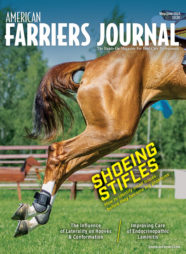With a smooth gait well-suited for carrying riders great distances in comfort, the Tennessee walking horse is symbolic of the American South. The breed's unique running walk and high-stepping gait, known as the “big lick,” can bring big money in the show ring. Those high steps kick up more than dirt in the arena. They’re kicking up tensions in the horse community lately, as well.
Two bills before Congress seek to amend the Horse Protection Act of 1970 to stop an abusive technique known as soring. The original law banned soring, but four decades years later, the practice continues.
Soring involves inflicting pain to the front pasterns (ankles) or front feet so that the horse lifts its legs higher, trying to escape the pain. Soring techniques include the use of caustic agents and/or chains around the pasterns, sharp objects embedded under the pads of the shoes and special shoes designed to increase pressure to the sole of the foot. While many horse experts maintain that soring is practiced by a minority of “bad actors,” violations are found at the highest-level shows.
Proponents of the two proposed amendments to the Horse Protection Act claim that their respective bills will crack down on soring. But they do so in very different ways.







Post a comment
Report Abusive Comment